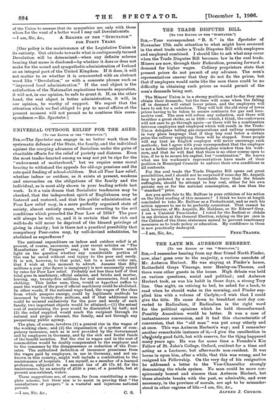UNIVERSAL OUTDOOR RELIEF FOR THE AGED.
[To TUT EDITOR OF THE " SPECTATOR:] Sin,—The Spectator can engage in no better work than the systematic defence of the State, the family, and the individual against the creeping advances of Socialism under the guise of charitable efforts for the relief of poverty and distress. Even the most tender-hearted among us may not yet be ripe for the "endowment of motherhood," but we require some moral bracing to withstand the appeals for old-age pensions and the rate-paid feeding of school-children. But all Poor Law relief, whether indoor or outdoor, as it exists at present, weakens and encroaches on the obligations of the family and the individual, as is most ably shown in your leading article last week. Is it a vain dream that Socialistic tendencies may be checked, that the independent spirit of Englishmen may be fostered and restored, and that the public administration of Poor Law relief may, in a more perfectly organised state of society, almost entirely cease, without reverting to the evil conditions which preceded the Poor Law of 1834? The poor will always be with us, and it is certain that the rich and well-to-do will never be deprived of the blessed privilege of giving in charity ; but is there not a practical possibility that compulsory Poor-rates may, by well-devised substitutes, be abolished as superfluous P The national expenditure on indoor and outdoor relief is at present, of course, enormous, and your recent articles on "The Manufacture of Paupers" may, let us hope, throw much light on the question whether any considerable portion of this can be saved without real injury to the poor and needy. It is not, however, to that point, but to a much wider one, that I wish at this moment to advert. Assume that fifty millions a year (the figure is imaginary) is now necessarily raised by rates for Poor Law relief. Probably not less than half of that total goes in machinery, official salaries, and bricks and mortar, leaving, say, twenty-five millions for real necessaries, food and clothing. This latter sum, then, would ex hypothesi suffice to meet the wants of the poor if official machinery could be abolished. In other words, if the national wage fund, the wages of the class from which paupers emerge, could by legitimate methods be increased by twenty-five millions, and if that additional sum could be secured exclusively for the poor and needy of each family, two important objects would be attained,—(1) the actual cost of maintaining the poor would be diminished by half; and (2) the relief supplied would reach the recipient through its natural and proper channel, the family, and not through any pauperising public agency.
The plan, of course, involves (1) a general rise in the wages of the working class; and (2) the organisation of a system of com- pulsory insurance, such as is now provided by the Government and by employers in Germany, and by the sick and burial funds of the benefit societies. But the rise in wages and in the cost of commodities would be doubly compensated to the employer and to the consumer by the disappearance or reduction of the Poor- rates. The authorised deduction of insurance premiums from the wages paid by employers, in use in Germany, and not un- known in this country, might well include a contribution to the maintenance of hospitals. I am myself, as a member of a learned profession, subjected to an annual tax of .28 17s. 4d. for the maintenance, by an annuity of £150 a year, of a possible, but at present non-existent, widow.
These suggestions are, of course, far from constituting a com- plete scheme, but their aim is to assist in proving that "the manufacture of paupers" is a wasteful and injurious national pursuit.






























































 Previous page
Previous page